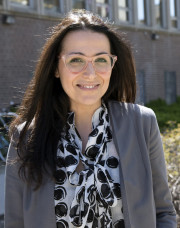Member Spotlight: Neda Maghbouleh on Improving the U.S. Census
“At the American Medical Association, we are working to refine our data systems to include Middle Eastern and North African (MENA) as a separate racial category...I connected with SSN’s Neda Maghbouleh, after finding her published research on this topic. Her scholarship is helping us move toward our goals of using inclusive and relevant race and ethnicity categories in our work." – Fernando De Maio, Vice President of Health Equity Research and Data Use, American Medical Association
An estimated 3 million Middle Eastern and North African (MENA) Americans live in this country, but many of them feel as though they are invisible. With no box to check on the census or most surveys and forms, MENA Americans’ racial and ethnic identities are often overlooked, not only impacting their sense of self but also important policy decisions. But Professor Neda Maghbouleh set out to change that.
Maghbouleh’s research, which focuses on the exclusion faced by MENA Americans, is helping to pave the way for the census, the American Medical Association, and other organizations to start counting this group. And these exciting developments are a direct result of Maghbouleh’s proactive media and policy engagement efforts.
For her membership contribution, Maghbouleh published an OpEd in Newsweek with fellow SSN members René D. Flores and Ariela Schachter on the need for a MENA-specific box on the census. According to Maghbouleh and her co-authors, the inclusion of a MENA identity category on the census would allow researchers to better examine the social, economic, and health status of this population, while also aligning more closely with how members of this group understand their own identity and are seen by others. The OpEd draws on the findings of a research collaboration between its authors that was published in the high-profile scientific journal PNAS: Middle Eastern and North African Americans may not be perceived, nor perceive themselves, to be White.
In the OpEd, Maghbouleh and her co-authors highlight key findings from their study showing 80% of MENA respondents chose “White” and 15% chose “Some Other Race” when no MENA option was offered, yet when a MENA identity category was added, 88% of the respondents chose this option. At the same time, their experiments found that everyday people clearly "see" MENA Americans as a distinct group.
Highlighting the importance of a MENA identity category for understanding the challenges and inequalities faced by the estimated three million MENA Americans, the authors wrote:
“The U.S. is nearly alone in counting MENAs as white. Just north of our border, Canada recognizes MENAs as visible minorities and offers them a census box. Analyzing this data, researchers have found that MENA Canadians have some of the highest infection and hospitalization rates for COVID-19 in Toronto, Canada's most populous city. First-generation MENA immigrants also experience the largest earnings gap among all ethnic and racial groups in Canada, earning 67 cents for every dollar their non-minority counterparts earn. Unfortunately, because MENA Americans are counted as white in the U.S., it is impossible to do similar population-level analyses.”
Following the publication of their OpEd, the researchers were contacted by NPR's Hansi Lo Wang for a reported story focused on their findings. This then led to an invitation for Maghbouleh to present her MENA research to the entire staff of the Census this past July, which she described as “a life changing experience.”
As it turned out, Maghbouleh’s work could end up being life changing for all MENA Americans. After her visit to the Census, the Federal Interagency Technical Working Group on Race and Ethnicity Standards issued a federal proposal to add MENA to official documents, like the census.
“The thing that's so exciting is that takeaways and language from our research – that article in PNAS and our op-ed in Newsweek – appears in the interagency working group's MENA proposal," Maghbouleh said. “I have always strived to do work that could serve people outside of academia. But to be able to actually provide evidence and academic research for people who were looking for that, in the kinds of advocacy and policy work that they're doing, has been exciting and affirming for me.”
While the Biden Administration's proposal awaits approval, there are non-governmental groups like the American Medical Association that have already added a MENA box after speaking with Maghbouleh. Fernando De Maio, Vice President of Health Equity Research and Data Use, shared, "At the American Medical Association, we are working to refine our data systems to include Middle Eastern and North African (MENA) as a separate racial category...I connected with SSN’s Neda Maghbouleh, after finding her published research on this topic. Her scholarship is helping us move toward our goals of using inclusive and relevant race and ethnicity categories in our work."
For more about Maghbouleh’s research and what it could mean for MENA Americans, listen to Scholars Strategy Network’s No Jargon episode 246: No Box to Check.

Maghbouleh's research focuses on the racialization of immigrants from the Middle East and North Africa (MENA) in the United States and Canada. Overarching themes in Maghbouleh's writings include migration, borders, xenophobia, culture, and politics.
